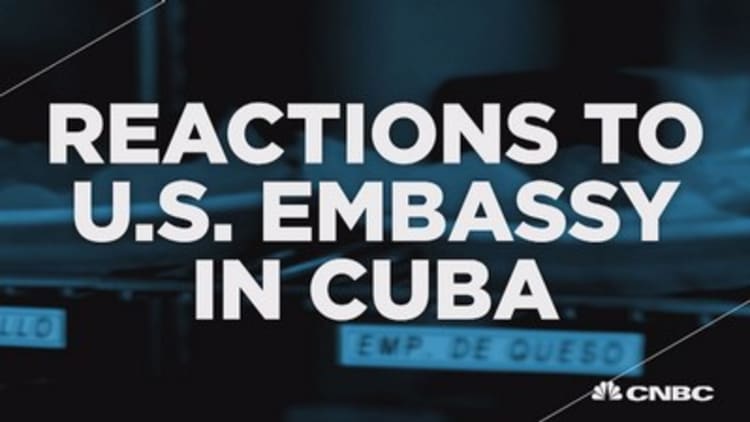
It only took 50 years, but the Cuban-American community of New Jersey is finally getting what they want from the federal government.
President Barack Obama announced in a statement Wednesday that the U.S. and Cuba will formally re-establish relations by opening embassies in both countries, and some Cuban-Americans are saying it's about time.
Randy Flores' family owns Havana on the Hudson, a cigar shop in Weehawken, New Jersey. After waiting half a century for diplomatic relations to change, Flores said that open embassies are a step in the right direction.
"It's a long time coming for a lot of people," he said. "Whether or not they're doing it for reasons that aren't just political, I'm not sure, but it brings a lot of hope to people."
Read MoreUS, Cuba reach deal to reopen Cuban embassies
Flores, whose grandfather began rolling cigars after emigrating from Cuba in the 1950s to escape Fidel Castro, said his family on the island has seen gradual improvements since the Obama administration began easing relations with Cuba last year, but a physical embassy might bring real change.
"I think when they see the embassy in Cuba, they may get a better sensation of 'OK, things are changing,' " he said. "A lot of the media is dictated by the government there, so maybe what they're hearing isn't as much as what they know."
Lidaysis Hernandez, a student who lived in Cuba until she was 3, said reopening the embassies shows meaningful action on both sides.
"It's overdue," she said. "It was time, after 50 years-plus of the island being closed off, it's time for the island to be experiencing what's going on here, since we're only 90 miles away, but also for us to experience what's going on there."
Read MoreCuba is opening slowly, but it has a long way to go
Since relations began improving, Hernandez said her family has seen improvements in an unlikely place, the grocery store.
Instead of picking things from sparse shelves and paying with "la libreta," the Cuban equivalent of food stamps from the government, Hernandez said that people can now shop more freely.
"Grocery stores are full, and now it's the same thing we would experience here," she said. "You go, you pick up a can of beans for 99 cents, and you pay for it. That's something new to them and it's exciting; at the same time, it's kind of frightening."
Hernandez said she wants to visit Cuba again before the culture is changed from open borders.
"It will gradually change, it's inevitable," she said. "It's been open to the rest of the world since 2006, all the cruise lines from Europe have been stopping there. It has a hugely European tourist population that has always constantly been going. But now, this is the ultimate opening to the U.S."
Carlos Santos, who was getting lunch at Pizzeria Cubana in Union City, New Jersey, said he thinks the change is a good thing, but older generations are concerned.
"It's about time. It's going to be a long road, but it's a step forward," he said. "There's plenty of people upset about it, but if you look at it, it's the people who were in the country when Castro came to power. But the newer generations, we just want to get this over and improve our quality of life."
He said that what he is looking forward to most is traveling back to the country where he was born. "I would like to go back more often, a lot more often," he said.
Tourism in Cuba could be a major benefit from the opening of the border.
Read More
"Back in the '60s, it was America's playground," Hernandez said. "Ferries came and went every day. There's an exchange that could have been happening years ago."
Cuba's medical industry is also worth considering, Flores said.
"There are a lot of reasons to open it up," he said. "Tourism is one of them, Cuba was always a destination. Medical systems over there, you see headlines about how some of the innovations they have can make their way here."
Hernandez said that, since education is mandated up to college, the Cuban population is highly educated, which has contributed to a growing health-care industry.
The New York Times reported Tuesday that Cuba was certified by the World Health Organization for ending mother-to-child HIV transmission.


